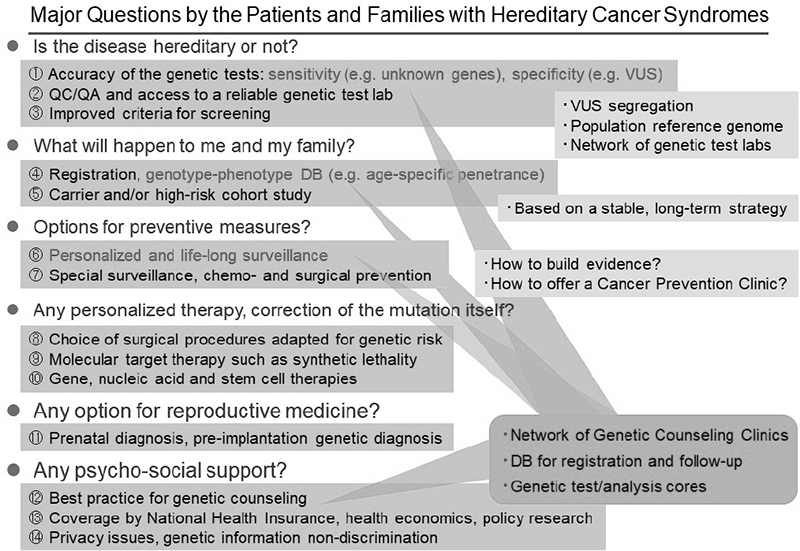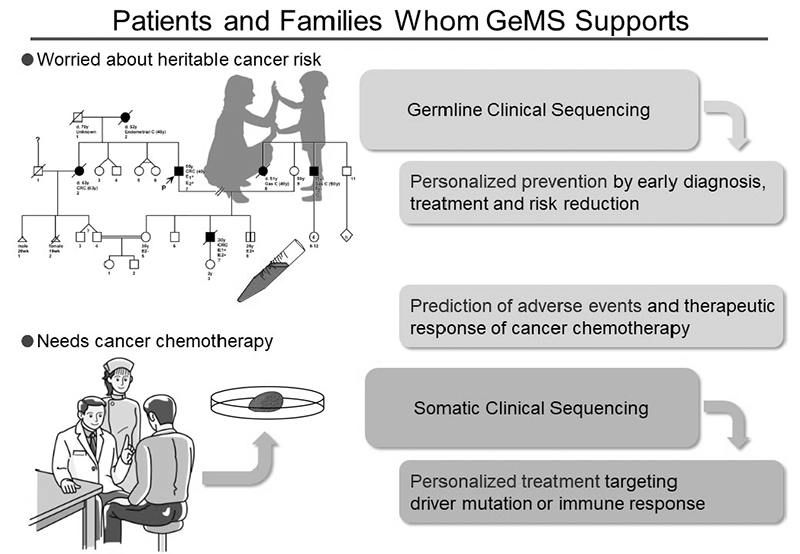Annual Report 2019
Department of Genetic Medicine and Services
Teruhiko Yoshida, Makoto Hirata, Kokichi Sugano, Narikazu Boku, Shigenobu Suzuki, Akihiko Shimomura, Mitsuya Ishikawa, Tadashi Kumamoto, Nobuyoshi Hiraoka, Shigeki Sekine, Taisuke Mori, Kuniko Sunami, Noboru Yamamoto, Takahisa Matsuda, Hiromi Sakamoto, Mineko Ushiama, Takashi Kohno, Sadakatsu Ikeda, Mamoru Kato, Hitoshi Ichikawa, Noriko Tanabe, Tomoko Watanabe
Introduction
It has been estimated that roughly 5% of all cancer cases are caused by a highly penetrant monogenic mutation. Major causative genes for most hereditary cancer syndromes were identified in the 1990s, and since then, genetic diagnosis has been considered as a part of standard medical care in oncology clinics. The National Cancer Center Hospital (NCCH) launched the Outpatient Genetic Counseling Clinic in 1998 as a part of collaboration with the NCC Research Institute, especially the Fundamental Innovative Oncology Core (FIOC). However, cancer medical genetics still has a number of issues to be addressed as shown in Figure 1.

The Team and What We Do
The Department of Genetic Medicine and Services (GeMS) consists of 16 doctors, five researchers, and two genetic counselors. All of these staff hold the concurrent post of another department and research division, except the genetic counselors.
As shown on the NCCH web site, the aim and mission of the clinical service of the Outpatient Genetic Counseling Clinic, which are the major routine clinical activities of our department, are:
1) To provide consultation and appropriate medical and genetic information (that is, genetic counseling) to anyone who has a worry related to heredity cancer.
2) To provide genetic testing when appropriate.
3) To support early diagnosis and treatment based on family history and/or genetic test results.
4) To discuss clinical sequencing results of patients by participating in the Expert panel.
For the April 2019 to March 2020 period, 331 clients and their relatives visited the Clinic. Of these, 167 families and 228 clients newly visited this period. In total, 1,674 families have visited the clinic since its inception in 1998. Details are shown in Table 1.
Table 1. Number of new clients (Apr. 2018 - Mar. 2019)

Research activities
Although at least one causative gene has been identified for each of the major hereditary cancer syndromes, overall sensitivity of the current genetic tests is far from 100% and may be around 70-80%, even for the cases that meet clinical and/or screening criteria for hereditary cancer syndromes. The false negative cases may include both inadequate technical sensitivity of the current genetic test methods on the established causative genes (allelic heterogeneity) and also yet-to-be-identified genes representing locus heterogeneity. There has been great expectation that the introduction of next generation sequencers (NGS) would change the situation. The staff of the Department of GeMS have established a new Common Protocol to perform NGS-based germline clinical sequencing for patients with negative test results by conventional genetic tests, who would represent a part of the Undiagnosed Disease Patients in the oncology field. The Common Protocol has been adopted by other hospitals and institutions in a long-standing multi-institute collaborative research group based on the National Cancer Center Research and Development Fund and its predecessor. In addition to whole exome sequencing (WES), a multi-gene panel has been developed based on Agilent SureSelect technology.
Clinical trials
We have participated in an expert panel of clinical sequencing conducted by health insurance systems since May 29, 2019.
Education
The Department has accepted attendees for outpatient genetic counseling, so that they could be eligible to take the examination for clinical geneticists and certified genetic counselors acknowledged by the Japanese Society of Human Genetics and the Japanese Society of Genetic Counseling. In 2019, eleven doctors registered as trainees for clinical geneticists in the education committee of clinical geneticists. Furthermore, from this year, we accepted three students of the genetic counseling course in the Graduate School of Health and Welfare Sciences, International University of Health and Welfare.
Future prospects
The Department of GeMS was launched in November 2015. Although this section reports on the routine clinical activity of the Department and clinical research associated directly with the Outpatient Genetic Counseling Clinic, the scope and mission of the Department extend beyond hereditary cancer syndromes and include support of the genomic biomarker-driven personalized cancer treatments offered by other clinical departments (Fig. 2). The core technology of the new discipline, also known as a precision medicine, is next-generation sequencers, which would bring massive amounts of genomic data to cancer diagnosis, treatment and prevention. The crux of this emerging opportunity is how to convert the sequence data to clinically valid and useful knowledge, which could include incidental or secondary findings. The Department of GeMS is expected to support other departments in the era of genomic medicine.

List of papers published in 2019
Journal
1. Momozawa Y, Iwasaki Y, Hirata M, Liu X, Kamatani Y, Takahashi A, Sugano K, Yoshida T, Murakami Y, Matsuda K, Nakagawa H, Spurdle AB, Kubo M. Germline Pathogenic Variants in 7636 Japanese Patients With Prostate Cancer and 12 366 Controls. J Natl Cancer Inst, 112:369-376, 2020
2. Sunami K, Ichikawa H, Kubo T, Kato M, Fujiwara Y, Shimomura A, Koyama T, Kakishima H, Kitami M, Matsushita H, Furukawa E, Narushima D, Nagai M, Taniguchi H, Motoi N, Sekine S, Maeshima A, Mori T, Watanabe R, Yoshida M, Yoshida A, Yoshida H, Satomi K, Sukeda A, Hashimoto T, Shimizu T, Iwasa S, Yonemori K, Kato K, Morizane C, Ogawa C, Tanabe N, Sugano K, Hiraoka N, Tamura K, Yoshida T, Fujiwara Y, Ochiai A, Yamamoto N, Kohno T. Feasibility and utility of a panel testing for 114 cancer-associated genes in a clinical setting: A hospital-based study. Cancer Sci, 110:1480-1490, 2019
3. Shimomura A, Yonemori K, Yoshida M, Yoshida T, Yasojima H, Masuda N, Aogi K, Takahashi M, Naito Y, Shimizu S, Nakamura R, Hamada A, Michimae H, Hashimoto J, Yamamoto H, Kawachi A, Shimizu C, Fujiwara Y, Tamura K. Gene Alterations in Triple-Negative Breast Cancer Patients in a Phase I/II Study of Eribulin and Olaparib Combination Therapy. Transl Oncol, 12:1386-1394, 2019
4. Ikenoue T, Arai M, Ishioka C, Iwama T, Kaneko S, Matsubara N, Moriya Y, Nomizu T, Sugano K, Tamura K, Tomita N, Yoshida T, Sugihara K, Naruse H, Yamaguchi K, Nojima M, Nakamura Y, Furukawa Y. Importance of gastric cancer for the diagnosis and surveillance of Japanese Lynch syndrome patients. J Hum Genet, 64:1187-1194, 2019
5. Nakano MH, Udagawa C, Shimo A, Kojima Y, Yoshie R, Zaha H, Abe N, Motonari T, Unesoko M, Tamura K, Shimoi T, Yoshida M, Yoshida T, Sakamoto H, Kato K, Mushiroda T, Tsugawa K, Zembutsu H. A Genome-Wide Association Study Identifies Five Novel Genetic Markers for Trastuzumab-Induced Cardiotoxicity in Japanese Population. Biol Pharm Bull, 42:2045-2053, 2019
